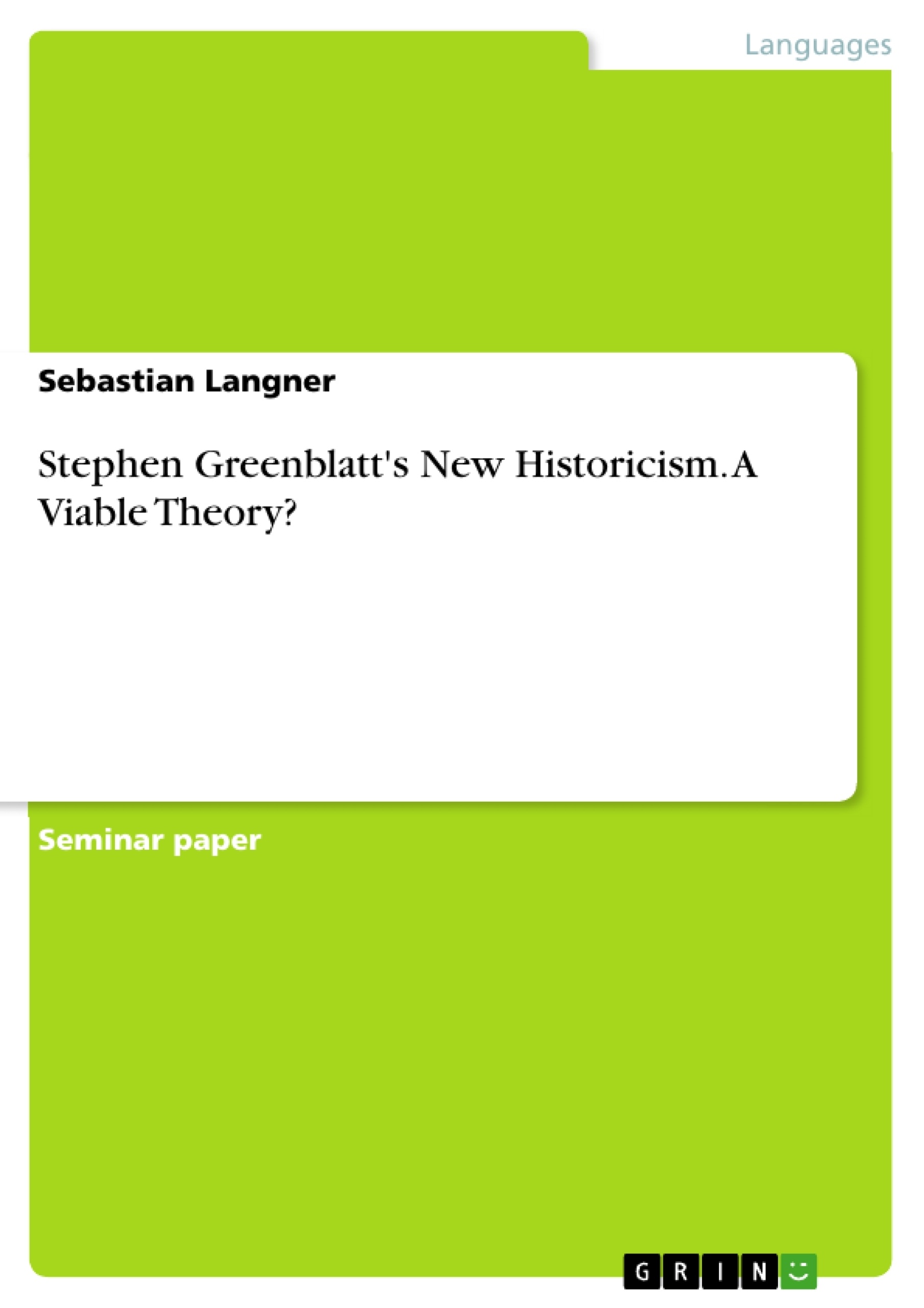By the 1990s, New Historicism and its main progenitor Stephen Greenblatt rose to the attention of scholars worldwide, and it is now a widely accepted theory.
If one can speak of a theory, since New Historicism has often been accused of lacking a distinct theoretical program. However, this did not remain the sole critical reproach New Historicism had to deal with. As with many a radically new idea, the approach provoked discontent as well. Inaccuracy and “armchair historicism” were among the accusations New Historicism had to cope with. Nevertheless, its popularity increased, and it is well nigh impossible to imagine literary studies today without it.
Despite its importance and popularity, the New Historicism has to this day successfully refused to be thoroughly theorized and classified, to be forced into a strict set of rules. It therefore remains a difficult task to label anything truly “New Historicist”, as even New Historicists themselves are reluctant to give a subsumable definition of the concept.The principal question of this thesis: Is New Historicism a viable theory after all? Despite the international acclaim it has earned, does it keep its promises? Has it revolutionized modern literary studies?
Table of Contents
- Introduction
- Stephen Greenblatt's New Historicism
- Stephen Greenblatt's New Historicism
- Styles and Techniques of New Historicism
- Criticizing New Historicism
- Conclusion
Objectives and Key Themes
This paper aims to explore Stephen Greenblatt's New Historicism, examining its principles, techniques, and criticisms. It investigates whether New Historicism, despite its lack of a rigid theoretical framework, constitutes a viable and influential approach to literary studies.
- The definition and characteristics of New Historicism.
- The methodologies and styles employed by New Historicists.
- Criticisms leveled against New Historicism and their validity.
- The overall impact and legacy of New Historicism in literary studies.
- The viability of New Historicism as a theoretical framework.
Chapter Summaries
Introduction: This chapter introduces the central problem of the relationship between literature and history, focusing on the challenge of extrapolating a general historical picture from individual literary works. It highlights the inherent temporality of literature, viewing each text as a "snapshot" of a specific moment and the difficulties inherent in using literature for historical reconstruction. The chapter sets the stage for the discussion of New Historicism as a theoretical response to these complexities, outlining the paper's objectives and methodology. The author's interest in Greenblatt’s New Historicism as a response to these questions is clearly established.
Stephen Greenblatt's New Historicism: This section delves into the core tenets of Stephen Greenblatt's New Historicism. It acknowledges the surprising lack of a formalized theoretical structure despite its widespread adoption. The chapter draws heavily from Greenblatt and Gallagher's "Practicing New Historicism," highlighting Greenblatt's own surprise at the theory's evolution into a distinct field of study. It emphasizes the difficulty in defining the theory definitively due to its flexible and evolving nature. The author establishes Greenblatt as the leading figure of New Historicism and uses his work as a primary source for this part of the paper.
Keywords
New Historicism, Stephen Greenblatt, literary studies, history, textual analysis, cultural context, interpretation, criticism, methodology, theory, historical reconstruction.
Frequently Asked Questions: A Comprehensive Overview of Stephen Greenblatt's New Historicism
What is the main focus of this document?
This document provides a comprehensive overview of Stephen Greenblatt's New Historicism. It examines its principles, techniques, criticisms, and its overall impact and legacy within literary studies. The document includes a table of contents, objectives and key themes, chapter summaries, and keywords.
What are the key themes explored in the document?
The key themes include the definition and characteristics of New Historicism; the methodologies and styles employed by New Historicists; criticisms of New Historicism and their validity; the impact and legacy of New Historicism in literary studies; and the viability of New Historicism as a theoretical framework. The document specifically focuses on Stephen Greenblatt's contributions and the surprising lack of a rigid theoretical structure within the approach.
What are the main chapter summaries provided?
The introduction establishes the relationship between literature and history, highlighting the challenges of using literature for historical reconstruction. The chapter on Stephen Greenblatt's New Historicism delves into its core tenets, emphasizing its flexible and evolving nature and drawing heavily from Greenblatt's own writings. The document does not provide summaries for "Criticizing New Historicism" or the Conclusion.
What are the objectives of this paper?
The paper aims to explore Stephen Greenblatt's New Historicism, examining its principles, techniques, and criticisms. It investigates whether New Historicism, despite its lack of a rigid theoretical framework, constitutes a viable and influential approach to literary studies.
What are the keywords associated with this topic?
The keywords include: New Historicism, Stephen Greenblatt, literary studies, history, textual analysis, cultural context, interpretation, criticism, methodology, theory, historical reconstruction.
What is the overall argument or conclusion of the document (as far as can be gleaned from the provided summaries)?
The overall argument is likely to explore the strengths and weaknesses of Greenblatt's New Historicism as a method for literary analysis, considering its impact and influence despite its less formalized theoretical structure. The full conclusion is not provided in the summaries.
What is the significance of Stephen Greenblatt's role in New Historicism?
The document establishes Stephen Greenblatt as the leading figure of New Historicism, using his work as a primary source for understanding the approach. It highlights his own surprise at the theory's evolution into a distinct field of study.
Where can I find more information on New Historicism?
This document provides a starting point. Further research can be conducted using the keywords provided, focusing on Stephen Greenblatt's works and other scholarly articles on New Historicism in literary studies. "Practicing New Historicism" by Greenblatt and Gallagher is cited as a key source.
- Citar trabajo
- Sebastian Langner (Autor), 2011, Stephen Greenblatt's New Historicism. A Viable Theory?, Múnich, GRIN Verlag, https://www.grin.com/document/281414



